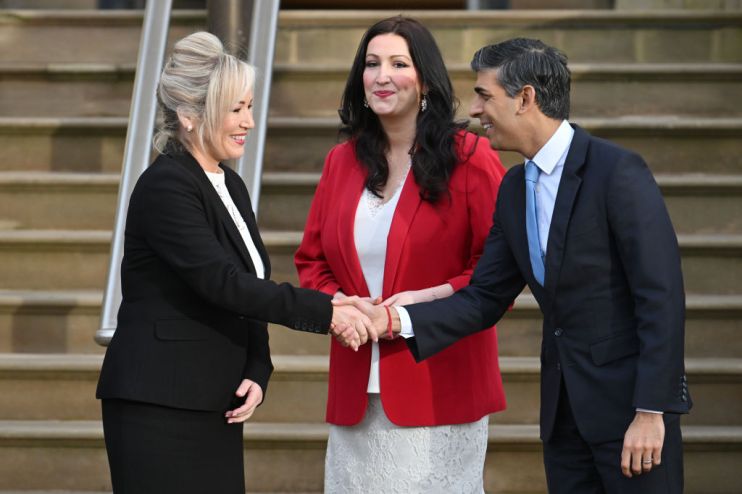
Michelle O’Neill’s historic appointment ushers in an era of cautious cooperation, with much to gain or lose on all sides, writes Eliot Wilson
There was a pilot who used to announce to his passengers on approach to George Best Airport, “We will shortly be landing in Belfast – please set your watches back 300 years”. Those returning home would roll their eyes or smile in that patient, stoical way characteristic of Ulster. You don’t easily escape the past.
The appointment of a new Northern Ireland executive nine days ago was both historic and historical. Michelle O’Neill was the first nationalist to become first minister, but she did so in a polity created 103 years ago with borders drawn deliberately to make such an outcome impossible. The UK prime minister, Rishi Sunak, leads the Conservative and Unionist Party, the second adjective a legacy of the union between Britain and Ireland; his Irish counterpart, taoiseach Leo Varadkar, is the head of Fine Gael, which emerged from supporters of the 1921 Anglo-Irish Treaty and claims the heritage of Michael Collins. That’s how it works.
O’Neill faces a dilemma between her fundamental goal of a united Ireland and the hard slog of administering Northern Ireland. Predictably she was upbeat about the former, talking of “the decade of opportunity” and “pursuing our legitimate aspirations”. Equally predictable was the Northern Ireland secretary, Chris Heaton-Harris, predicting that there would be no poll of a united Ireland “in my lifetime”.
Perhaps more surprising was the Irish taoiseach saying that unification was “not for today” and that he was “confident that the institutions will last”. But Varadkar recognises that the interwoven relationships are complicated. He may share the desire for a united Ireland, but he faces a general election within 13 months, and Sinn Féin has led the opinion polls comfortably for three years: a recent survey put the party on 29 points, with Fine Gael on 19 and their coalition partners Fianna Fáil on 17.
Sinn Féin’s leader, Mary Lou McDonald, has warned voters that “the danger for Ireland isn’t change, the danger is inertia”, and spoke of sharing the “anger” people feel about housing and public services.
The relationship between the UK and Ireland is also knotty. In December, the Dublin government filed a case with the European Court of Human Rights over the Northern Ireland Troubles (Legacy and Reconciliation) Act 2023, agreed by Westminster last year; the statute attempts to draw a line under offences committed during the Troubles, but the Irish government is arguing it gives immunity to those guilty of serious crimes. (Quite clearly, both arguments are true.)
This comes in a period of existing tension. The Brexit referendum and its implications for the Irish border caused friction, while few in Dublin were happy to see the Democratic Unionist Party maintaining the Conservative government after the 2017 general election. Meanwhile some UK politicians have felt that Varadkar and his predecessor Micheál Martin took a high-handed and inflexible approach to negotiations over Brexit.
The pressing challenge for Northern Ireland, now that political institutions are in place, is an economic one. The UK government is insisting on a review of public revenue and expenditure to create a more sustainable model –currently Northern Ireland receives 90 per cent of its funding in a block grant from HM Treasury – and the executive must somehow balance a large, resource-hungry public sector which makes up a third of the economy against a relatively low taxation base by UK standards.
Increased inward investment was held out as a prize for restoring devolution. Joseph Kennedy III, President Biden’s special envoy to Northern Ireland and grandson of Senator Robert F Kennedy, was in Northern Ireland only a fortnight ago, highlighting the investment which has already come from the United States and praising Northern Ireland’s cyber security, bio-technology, AI and aerospace sectors. But inevitably Northern Ireland is competing with Dublin for foreign money.
Fractious relations across the Irish Sea date back almost 900 years, well within the ambit of “it’s complicated”. Sunak and Varadkar lead parties shaped by Ireland, but each could be out of office within a year. Each has reason to keep a distance from Sinn Féin, yet each in a way needs Sinn Féin to succeed. And Sinn Féin itself faces an historic opportunity but cannot afford to fail. For the moment, it must be cautious co-operation, without ever losing sight of wider threats.